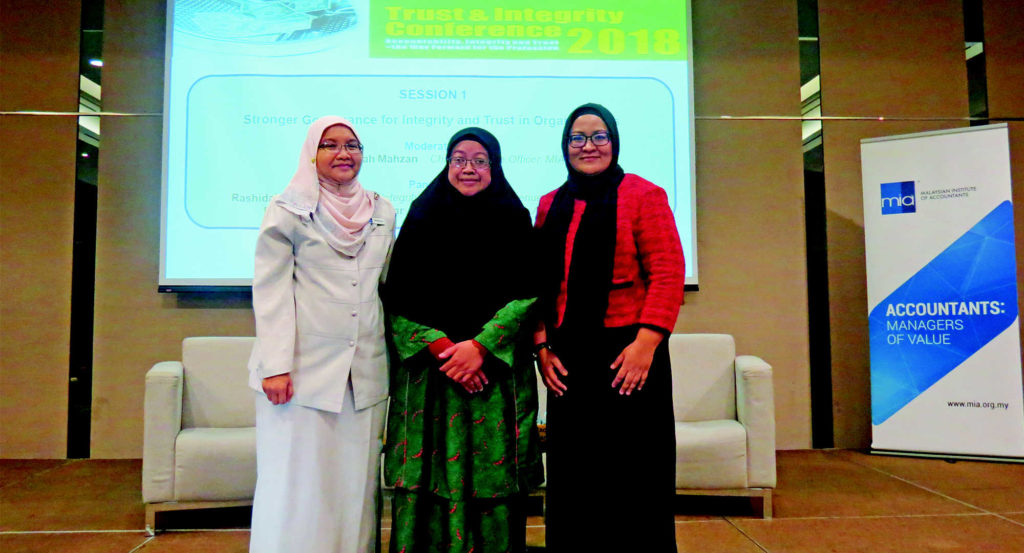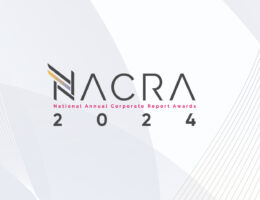
How can we foster stronger governance in organisations, and in turn improve perceived and actual integrity and trust? How can organisations help their employees to always do the right thing and make the right decision to support integrity and good reputation?
by Majella Gomes
Integrity is doing the right thing even when no one is watching. But how many can resist the temptation of sneaking through a red light at 3:00am, when there’s obviously no oncoming traffic?” asked Dr. Nurmazilah Dato’ Mahzan, CEO, MIA, in her preamble to the panel discussion on Stronger Governance for Integrity and Trust in Organisations at the recent MIA Trust & Integrity Conference 2018. Dr. Nurmazilah served as session moderator, with panellists Rashidah Hussen, Director, Integrity Division, IRBM, and Eulis Rachmatiah Iskandar, Head of Ethics, Celcom Axiata Berhad providing public and private sector perspectives.
The following are some key takeaways from the discussion:
Accountants are Important Gatekeepers of Integrity
Fostering the strength of the accounting and finance function in an organisation can be critical to protecting governance and integrity, because accountants are recognised for their roles as gatekeepers. The International Federation of Accountants (IFAC) advocates for the accountancy profession’s pivotal role in countering corruption, and this is supported by IFAC’s most recent issuances developed from documents at the G-20 Leaders’ Summit 2016. “The world is seeking stronger governance through higher levels of trust and integrity in the business and public sectors, and stronger, more consistent collaboration in the global regulatory environment, and accountants are party to this by virtue of their roles in the global compliance and economic ecosystems,” emphasised Dr. Nurmazilah.
Assurance from the accountancy profession could also be a tool to counter the negative perceptions of Malaysia in the Corporate Governance Watch Index. Low scores in the categories of politics and regulation are indications of declining public trust that need to be swiftly addressed. “Fortunately, auditing and accounting appear to be our strengths,” said Dr. Nurmazilah, and these assets help to succour a positive climate of assurance and trust.
Governance and Enforcement are Pivotal
Institutional governance, regulation and enforcement can impose the necessary rules and standards that support integrity and trust, thereby having a direct impact on society, noted Rashidah. Compliance with regulations such as Sarbanes-Oxley and the Frank-Dodd Act have not just helped the private sector to avoid punitive fines and penalties, said Eulis, but is a differentiating factor that can help companies secure the best talent from around the world.
Everybody has a Role to Play
Personal responsibility, conscience and morals differentiate those with integrity. “We have to behave and have higher standards than the market around us. It is up to everyone to do the right thing,” advised Eulis. “All levels need to understand their respective roles and modify (their behaviour) to suit their objectives,” concurred Rashidah. “Everyone is a leader in their own environment.”
At the same time, tone from the top is imperative. It is the Board of Directors’ responsibility to ensure that the right approach is cascaded down to other levels of the organisation, said Rashidah. What happens when the tone at the top is not what it should be? There will be consequences: you will lose people. “People won’t want to work with you,” Eulis said, adding that employees today were doing due diligence on their employers before taking up job offers.
Ensure All Systems Go, Backed by the Right Culture
A conducive environment for trust and integrity can be nurtured by putting in the appropriate policies, communications, training, risk assessment, internal controls, and the proper protocols for managing situations that test integrity.
But these are soulless and ineffective in shaping the right behaviour even when nobody is looking, if organisations don’t also take steps to perpetuate and inculcate the right culture. Ultimately, how individual behaviour and values are applied when operating in the corporate environment basically underpins the creation of an ethical organisational culture – which will in turn encourage the right behaviour among staff, inculcate integrity and develop good governance. “At the heart of integrity is making the right decision,” said Dr. Nurmazilah. Each organisation is an individual entity; it has to work out the best way to enable its systems, people and processes to make the right choices.
Institutional Initiatives for Integrity
Institutions too must play their respective roles to ensure security and integrity, especially the integrity and protection of data in an increasingly digital and connected world where one decision can have multifarious consequences. While business drives economic prosperity by providing jobs and training, the information it has access to needs to be appropriately safeguarded from misuse and abuse. Non-Governmental Organisations can play a watchdog role by supporting the poor, identifying instances of the abuse of power and exploitation or oppression of marginalised groups and generally fostering a sense of community. The media safeguards the quality of information that is disseminated, and correctly educates, informs and entertains the public in a wholesome, positive way. In parallel, the government should prioritise economic prosperity for its citizens and ensure integrity of its social mission by guaranteeing equitable distribution of resources and wealth for all.







